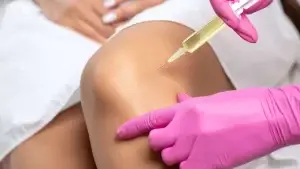The Advantages of PRP Injections for Chronic Knee Joint Pain
Are you suffering from chronic knee joint pain that seems to have no solution? If so, you’re not alone. Many people struggle with ongoing knee pain that limits their mobility and quality of life. This article will explore the benefits of PRP injections for chronic knee joint pain and how they can provide long-lasting relief.
Fortunately, a treatment option is gaining traction in the medical world: PRP injections. PRP, or platelet-rich plasma, is a treatment that utilizes your body’s healing properties to alleviate pain and promote tissue regeneration.
PRP injections offer a promising alternative to more invasive treatments, such as surgery, from reducing inflammation to stimulating natural healing processes.
So, if you’re looking for a non-surgical solution to your chronic knee pain, keep reading to discover the incredible benefits of PRP injections. Relief may be just a few injections away.
In this article, we are going to discuss the following:
Understanding PRP injections for knee joint pain
Benefits of PRP injections for chronic knee joint pain
Research and studies on the effectiveness of PRP injections
What to expect during a PRP injection procedure
Recovery and potential side effects of PRP injections
Who is a good candidate for PRP injections?
PRP injections vs. other treatment options for knee joint pain
Finding a qualified provider for PRP injections
Conclusion: The Benefits of PRP Injections for Chronic Knee Joint Pain
Understanding PRP injections for knee joint pain in Plantation, Fl
PRP injections have emerged as a promising solution for individuals suffering from chronic knee joint pain. To understand how PRP injections work, it’s essential first to grasp the concept of platelet-rich plasma.
Platelets are tiny cells in our blood that are crucial to healing. They contain growth factors and other proteins that promote tissue repair and regeneration.
A small amount of blood is drawn from the patient during a PRP injection. The blood is then placed in a centrifuge, which separates the platelets from the other components of the blood. The resulting platelet-rich plasma is injected directly into the affected knee joint area.
How do PRP injections work?
The injection of platelet-rich plasma into the Knee joint triggers a cascade of healing processes within the body. The growth factors and proteins in the plasma stimulate the production of new cells and blood vessels, promoting tissue regeneration and repair.
This can reduce inflammation, relieve pain, and improve knee joint function.
One of the critical advantages of PRP injections is that they utilize the body’s natural healing properties. Unlike other treatment options that may involve medications or invasive procedures, PRP injections harness the power of the patient’s blood to promote healing.
This makes PRP injections a safe and effective option for individuals who may be hesitant to undergo surgery or use pharmaceutical drugs.
Benefits of PRP injections for chronic knee joint pain
PRP injections offer a range of benefits for individuals suffering from chronic knee joint pain. One of the primary benefits is the reduction of inflammation in the affected area.
Inflammation is a common cause of pain and discomfort in the knee joint, and PRP injections can help to alleviate this inflammation, providing relief for patients.
In addition to reducing inflammation, PRP injections stimulate the body’s natural healing processes. The growth factors and proteins in platelet-rich plasma promote the regeneration of damaged tissues and the formation of new blood vessels.
This can lead to improved function of the knee joint and a decrease in pain and stiffness.
Research has shown that PRP injections can also help slow the progression of osteoarthritis, a degenerative joint disease commonly affecting the knees.
PRP injections could delay the need for more invasive treatments, such as joint replacement surgery, by promoting tissue regeneration and repair.
Research and studies on the effectiveness of PRP injections
Numerous studies have evaluated the effectiveness of PRP injections for chronic knee joint pain. These studies have consistently shown positive results, with many patients experiencing a significant reduction in pain and improved function following PRP treatment.
A study published in the American Journal of Sports Medicine found that patients who received PRP injections for knee osteoarthritis experienced a more significant reduction in pain and improved function than those who received a placebo injection.
Another study published in the Journal of Orthopaedic Research showed that PRP injections improved cartilage quality in patients with knee osteoarthritis.
While more research is still needed to fully understand the long-term effects of PRP injections, the existing studies provide promising evidence of the effectiveness of this treatment for chronic knee joint pain.
What to expect during a PRP injection procedure
Knowing what to expect during the procedure is essential if considering PRP injections for your chronic knee joint pain. The first step is a thorough evaluation by a qualified healthcare provider who will determine if you are a good candidate for PRP injections.
Once it has been determined that PRP injections are a suitable treatment option for you, the procedure can be scheduled. On the day of the procedure, a small amount of blood will be drawn from your arm.
The blood will then be processed using a centrifuge to separate the platelet-rich plasma from the other components.
After the PRP has been prepared, it will be injected directly into the affected area of your knee joint. The injection is typically performed under ultrasound guidance to ensure accuracy and precision. The procedure usually takes about 30 minutes to an hour, and you can typically go home shortly after.
Recovery and potential side effects of PRP injections
After receiving PRP injections, following your healthcare provider’s instructions for recovery is essential. You may be advised to rest the treated Knee and avoid strenuous activities for a certain period.
Your healthcare provider may also recommend physical therapy to help strengthen the muscles around the knee joint and improve your overall mobility.
As with any medical procedure, there is a potential for side effects with PRP injections. However, most patients experience minimal side effects that are usually mild and temporary.
These may include swelling, bruising, and discomfort at the injection site. Serious complications are rare but can include infection or damage to nearby structures.
Who is a good candidate for PRP injections?
PRP injections are a suitable treatment option for individuals with chronic knee joint pain, particularly those with conditions such as osteoarthritis or ligament injuries.
However, only some are good candidates for PRP injections. Your healthcare provider will assess your case and determine if PRP injections are the right treatment option.
Factors that may affect your candidacy for PRP injections include:
- The severity of your knee pain.
- The underlying cause of your pain.
- Your overall health.
Your healthcare provider will consider these factors and discuss PRP injections’ potential risks and benefits with you.
PRP injections vs. other treatment options for knee joint pain
Regarding treating chronic knee joint pain, various treatment options are available. PRP injections offer several advantages over other treatments, particularly surgical interventions.
Unlike surgery, PRP injections are minimally invasive and do not require a lengthy recovery period. They also carry a lower risk of complications compared to surgical procedures.
Furthermore, PRP injections address the underlying cause of the pain by promoting tissue regeneration and repair. This sets PRP injections apart from other treatment options that may only provide temporary pain relief.
It’s important to note that PRP injections may not be suitable for everyone, and individual results may vary. It’s always recommended to consult with a qualified healthcare provider to discuss your specific situation and determine the most appropriate treatment plan for your chronic knee joint pain.
Finding a qualified provider for PRP injections for Knee in Plantation, Fl
If you’re considering PRP injections for your chronic knee joint pain, it’s crucial to find a qualified healthcare provider who specializes in this treatment.
Look for a provider with experience and expertise performing PRP injections who can provide personalized care and guidance throughout your treatment journey.
Consider seeking recommendations from trusted healthcare professionals or individuals who have undergone PRP injections. Their firsthand experiences can provide valuable insights and help you decide your treatment options.
FAQS:
Platelet-rich plasma (PRP) injections are an increasingly popular treatment for various knee conditions. Here are 15 frequently asked questions about PRP injections to the Knee, structured to provide detailed and educational information:
- What is PRP, and how is it obtained?
PRP stands for Platelet-Rich Plasma. A concentration of platelets and growth factors is derived from a blood sample.
To obtain PRP, a blood sample is taken and then spun in a centrifuge, separating the blood components and allowing for the extraction of plasma rich in platelets.
2. How does PRP work in knee treatment?
In the knee joint, PRP works by promoting natural healing. The growth factors and proteins in PRP can accelerate tissue repair and modulate inflammation, thus helping heal injured tendons, ligaments, muscles, and joints.
3. What knee conditions can PRP treat?
PRP injections are commonly used for the treatment of chronic knee pain due to conditions such as osteoarthritis, tendinitis, ligament injuries, and meniscus tears. They are also used post-surgery to enhance healing.
4. What is the procedure for a PRP injection to the Knee?
The procedure involves drawing blood from the patient, processing it to prepare the PRP, and then injecting the PRP directly into the affected knee area under sterile conditions. Ultrasound guidance may be used to increase precision.
5. Is the PRP knee injection procedure painful?
Patients may experience discomfort during the injection, similar to any other procedure. However, local anesthesia can minimize pain, and discomfort is usually short-lived.
6. What is the success rate of PRP injections for knee problems?
Success rates can vary based on the specific knee condition being treated, the severity of the issue, and individual patient factors. Some studies have shown favorable outcomes, particularly in treating knee osteoarthritis.
7. How long does it take to see results from a PRP injection?
The time frame for experiencing results can vary. Some patients may benefit within a few weeks, while others may take several months. Multiple injections may be necessary to achieve optimal results.
8. Are there any side effects or risks associated with PRP injections to the Knee?
As PRP uses the patient’s blood, the risk of an allergic reaction is low. However, as with any injection, there is a risk of infection, pain at the injection site, or injury to nerves and blood vessels. These risks are generally considered negligible.
9. How long do the effects of a PRP injection last?
The effects of PRP injections can be long-lasting, depending on the condition treated. The relief can last several months to a few years for some patients.
However, PRP is not a cure for underlying chronic conditions, and periodic treatments may be needed.
10. How many PRP injections will I need?
The number of PRP injections required can vary. Some patients only need a single injection, while others require several injections spaced weeks apart. Your doctor will determine the best treatment plan based on your specific condition.
11. Can PRP injections prevent the need for knee surgery?
In some cases, PRP injections can provide enough relief from pain and improvement in function to delay or avoid surgery. However, they cannot prevent surgery, especially in more severe cases.
12. What should I expect during the recovery period after a PRP injection?
Post-injection, you may be advised to rest the treated area for a few days. Some swelling and discomfort are normal but usually resolve within a few days. Your doctor will provide specific aftercare instructions.
13. Will my insurance cover PRP injections?
Coverage for PRP injections varies among insurance providers and policies. Many consider PRP to be experimental and may not cover the cost. It is essential to check with your insurance provider for details.
14. How do I know if I am a candidate for PRP injections?
Suitable candidates for PRP injections are individuals with knee pain due to soft tissue injuries or arthritis who have not responded well to conservative treatments. A consultation with a healthcare provider can help determine if PRP is appropriate for you.
15. What is the difference between PRP and other corticosteroids or hyaluronic acid injections?
PRP injections aim to stimulate and enhance the body’s natural healing process, while corticosteroids are anti-inflammatory agents that relieve temporary pain but do not repair the underlying damage.
Hyaluronic acid injections provide lubrication to the knee joint but do not contribute to tissue repair.
Conclusion: The Benefits of PRP Injections for Chronic Knee Joint Pain
Chronic knee joint pain can significantly impact your quality of life, making even simple tasks challenging. If you’re looking for a non-surgical solution to your pain, PRP injections may be worth considering.
PRP injections offer a promising alternative to more invasive treatments by harnessing the power of your body’s healing properties.
PRP injections have shown significant benefits for individuals suffering from chronic knee joint pain, from reducing inflammation to stimulating natural healing processes.
However, consulting with a qualified healthcare provider is essential to determine if PRP injections are the right solution for your case.
Relief from chronic knee joint pain may be just a few PRP injections away. Take the first step towards a pain-free life by exploring the benefits of PRP injections and finding a qualified healthcare provider who can guide you through the treatment process. Don’t let chronic knee pain hold you back any longer.
I am ready to begin my healing
“Ready to take control of your knee pain with PRP injections? Call Plantation Med Spa now at (954) 595-2607 or schedule your appointment online. Experience the transformative power of regenerative medicine today!”








